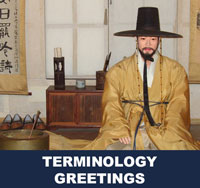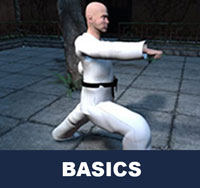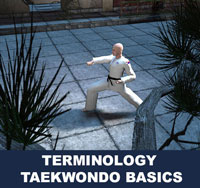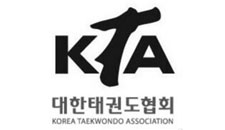Taekwondo 태권도Taekwondo Preschool
Taekwondo is known for its emphasis on high kicking and fast hand techniques, which distinguishes it from other popular martial arts and combat sports such as karate. However, the World Taekwondo (WT) believes that because the leg is the longest and strongest limb a martial artist has, kicks thus have the greatest potential to execute powerful strikes without successful retaliation.
View Taekwondo 태권도 »

Korean Greetings Terminology
In taekwondo, Korean language is often used. During tests practitioners are usually asked what certain Korean words used in class mean. These words are fairly common amongst taekwondo schools, but accuracy of pronunciation can vary greatly.
Taekwondo can also be a great way to learn the Korean language by engaging in conversations with practitioners while at school. Here is a basic list of commonly used words that might be expected. Knowing the fundamental basics is very important for your learning path as you build your skills and knowledge. When you reach senior belt you are expected to guide the junior belts when they are beginning Taekwondo such as showing by example.
| Hangul 한글 | Korean | |
| Hello | 안녕하세요! | annyeonghaseyo! |
| Nice to meet you! | 만나서 반갑습니다! | mannaseo bangabseubnida! |
| What's your name? | 너 이름이 뭐니? | neo ileum-i mwoni? |
| My name is John | 제 이름은 존이에요 | je ileum-eun jon-ieyo |
| How are you? | 잘 지냈어요? | jal jinaess-eoyo? |
| I'm fine | 난 괜찮아 | nan gwaenchanh-a |
| I'm not fine | 난 기분이 좋지 않아 | nan gibun-i johji anh-a |
| Bye | 안녕 | annyeong |
| See you later | 나중에 봐요 | najung-e bwayo |
| See you tomorrow | 내일 봐요 | naeil bwayo |
| Yes | 예 | ye |
| No | 아니 | ani |
| Thank you | 고맙습니다 | gomabseubnida |
| Sorry | 죄송합니다 | joesonghabnida |
| I understand | 이해 했어 | ihae haess-eo |
| I don't understand | 이해가 안돼 | ihaega andwae |

Taekwondo Basics
Here is where you can learn more about Taekwondo 태권도. Knowing the fundamental basics is very important for your learning path as you build your skills and knowledge. There are certain rules that need to be followed to show respect to the master ( 사범님 sabeomnim ), the instructors ( 교사님 gyosannim ), other practitioners and to the martial arts. They vary between schools but many have similar rules and guidelines. For more information View Taekwondo Basics »
There are five tenets defined in the International Taekwondo Federation (ITF) and several more in World Taekwondo (WT).
Indomitable Spirit ( 백절불굴 baekjul-boolgool ): "To have indomitable spirit means to have the courage to stand up for what you believe in, no matter what odds you are up against, and to always give 100% effort in whatever you do." View Taekwondo Tenets »










